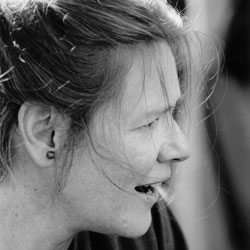There is a sound
that is a whole of many parts,
a sorrowless transparency, like luck,
that opens in the centre of a thing.
An eye, a river, fishheads, death,
gold in your pocket, and a half-wit
son: the substance of the world
is light and blindness and the measure
of our wisdom is our love.
Our diligence: ten fingers and
a healthy set of lungs. Practise
ceaselessly: there is
one art: wind
in the open spaces
grieving, laughing
with us, saying
improvise.
Notes on the Poem
Fascination with and love of music infuses much of the poetry comprising Jan Zwicky's "Forge." "Gigue" is the final section of a series of short pieces gathered under the title "Practising Bach". The title of each section following the prelude is a type of traditional dance, and collectively the entire poem encompasses a suite of different dance styles and steps, of which the gigue is probably the liveliest. As the name phonetically suggests, a gigue is a lively baroque dance similar to a jig. A jig is a jaunty dance consisting of lots of leaping and bouncing movements. You can't imagine feeling downhearted or pensive when you are either participating in or watching someone else perform a jig. In short, crisp, unadorned lines, Zwicky captures the rhythm and spirit of a jig. Surprisingly, her subject matter flits from the benign ("sorrowless", "an eye", "a river") to the practical ("diligence") to the seemingly positive ("luck", "gold in your pocket") to the possibly or definitely negative ("death", "blindness", "a half-wit son"). But the spritely tempo of the piece continues throughout, through joy and sorrow, to a final exhortation to try to laugh, to improvise, to prevail through it all. Literally and figuratively central to the dance is that "the substance of the world / is light and blindness and the measure / of our wisdom is our love."

simply brilliant